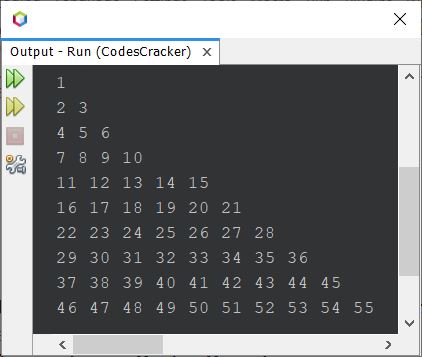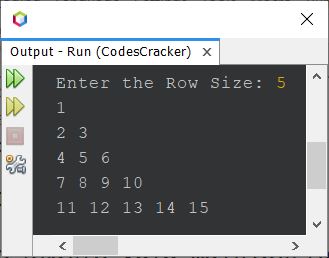- Java Basic Programs
- Java Programming Examples
- Java Print Hello World
- Java Get Input from User
- Java Print Integer
- Java Add two Numbers
- Java Check Even or Odd
- Java Check Prime or Not
- Java Check Alphabet or Not
- Java Check Vowel or Not
- Check Reverse equal Original
- Java Fahrenheit to Celsius
- Java Celsius to Fahrenheit
- Java Perfect Number Program
- Java Find Quotient Remainder
- Java Days to Seconds
- Java Count Digits in Number
- Java Binary Number Addition
- Java Discount Program
- Java Compute Courier Charge
- Java Find Telephone Bill
- Java Print ASCII Values
- Java Check Palindrome or Not
- Java Check Armstrong or Not
- Generate Armstrong Numbers
- Add two Numbers using Pointers
- Java Mathematical Programs
- Add Subtract Multiply & Divide
- Java Make Calculator
- Java Add Digits of Number
- Java Check Leap Year or Not
- Java Check Divisibility
- Java Find Simple Interest
- Java Find Compound Interest
- Java Print Fibonacci Series
- Java Find nCr nPr
- Calculate Average & Percentage
- Java Calculate Arithmetic Mean
- Java Calculate Student Grade
- Java Print Table of Number
- Java Print Prime Numbers
- Java Add n Numbers
- Java Interchange two Numbers
- Java Reverse Numbers
- Java Swap two Numbers
- Count Positive Negative & Zero
- Find Largest of two Numbers
- Find Largest of three Numbers
- Java Find Factorial of Number
- Java Find HCF & LCM
- Area & Perimeter of Square
- Area & Perimeter of Rectangle
- Area & Circumference of Circle
- Java Conversion Programs
- Java Decimal to Binary
- Java Decimal to Octal
- Java Decimal to Hexadecimal
- Java Binary to Decimal
- Java Binary to Octal
- Java Binary to Hexadecimal
- Java Octal to Decimal
- Java Octal to Binary
- Java Octal to Hexadecimal
- Java Hexadecimal to Decimal
- Java Hexadecimal to Binary
- Java Hexadecimal to Octal
- Java Pattern Programs
- Java Pattern of Stars
- Java Pattern of Alphabets
- Java Pattern of Numbers
- Java Pyramid of Stars
- Java Pyramid of Alphabets
- Java Pyramid of Numbers
- Java Print Diamond Pattern
- Java Print Floyd Triangle
- Java Print Pascal Triangle
- Java Array Programs
- One Dimensional Array Program
- Java Linear Search
- Java Binary Search
- Find Largest Element in Array
- Find Smallest Element in Array
- Java Reverse Array
- Insert Element in Array
- Delete Element from Array
- Java Merge two Array
- Java Bubble Sort
- Java Selection Sort
- Java Insertion Sort
- Java Find Common Elements
- Java Count Even/Odd Number
- Two Dimensional Array Program
- Java Add two Matrices
- Java Subtract two Matrices
- Java Transpose Matrix
- Multiply two Matrices
- Three Dimension Array Program
- Java String Programs
- Java Print String
- Find Length of String
- Java Compare two String
- Java Copy String
- Java Concatenate String
- Java Reverse String
- Delete Vowels from String
- Delete Words from Sentence
- Find Occurrence of a Character
- Java Find Occurrence of a Word
- Occurrence of Each Character
- Java Occurrence of Each Word
- Java Count Repeated Characters
- Java Count Repeated Words
- Java Capitalize Each Word
- Java Count Vowels/Consonants
- Java Extract Numbers
- Java Count Word in String
- Remove Spaces from String
- Java Sort a String
- Java Uppercase to Lowercase
- Java Lowercase to Uppercase
- Java Swap two Strings
- Java Check Anagram or Not
- Java Check Balance Parentheses
- Java Check Password Strength
- Java File Programs
- Java Read File
- Java Write to File
- Read & Display File Content
- Java Copy File
- Java Append Text to File
- Java Merge two File
- List files in Directory
- Java Delete File
- Java Miscellaneous Programs
- Generate Random Numbers
- Java Print Time & Date
- Java Get IP Address
- Java Shutdown Computer
- Java Programming Tutorial
- Java Tutorial
Java Program to Print Floyd's Triangle
This post covers a program in Java that prints Floyd's triangle. A right-angled triangle formed using natural numbers can be called as a Floyd's triangle. For example:
1 2 3 4 5 6 7 8 9 10 11 12 13 14 15
is Floyd's triangle of 5 rows or lines.
Print Floyd's Triangle in Java using for Loop
The question is, write a Java program to print Floyd's triangle. The program given below is its answer:
public class fresherearth { public static void main(String[] args) { int row=10, i, j, num=1; for(i=0; i<row; i++) { for(j=0; j<=i; j++) { System.out.print(num+ " "); num++; } System.out.print("\n"); } } }
The snapshot given below shows the sample output produced by above Java program on printing of a Floyd's triangle, that are of 10 rows:

Print Floyd's Triangle in Java using while Loop
Now let me create the same program using while loop, to show you, how the same program can be written or replaced using while.
public class fresherearth { public static void main(String[] args) { int row=10, i=0, j, num=1; while(i<row) { j=0; while(j<=i) { System.out.print(num+ " "); num++; j++; } System.out.print("\n"); i++; } } }
The above program can also be created in this way:
public class fresherearth { public static void main(String[] args) { int row=10, i=0, j, num=1; while(i++ < row) { j=0; while(j++ <= i) System.out.print(num++ + " "); System.out.print("\n"); } } }
You'll still get the exact output as of previous program. But the program becomes shorter than previous. The ++ operator after the variable, indicates that the operator is post-increment operator. Post-increment operator, first uses the current value of the variable, then increments its value by one, after the use.
Print Floyd's Triangle of Given Size in Java
Here is one more program on Floyd's triangle. This program allows user to define the size or row size of Floyd's triangle:
import java.util.Scanner; public class fresherearth { public static void main(String[] args) { int num=1; Scanner s = new Scanner(System.in); System.out.print("Enter the Row Size: "); int row = s.nextInt(); for(int i=0; i<row; i++) { for(int j=0; j<=i; j++) { System.out.print(num+ " "); num++; } System.out.print("\n"); } } }
The sample run of above program with user input 5 as row size of Floyd's triangle, is shown in the snapshot given below:

Same Program in Other Languages
« Previous Program Next Program »